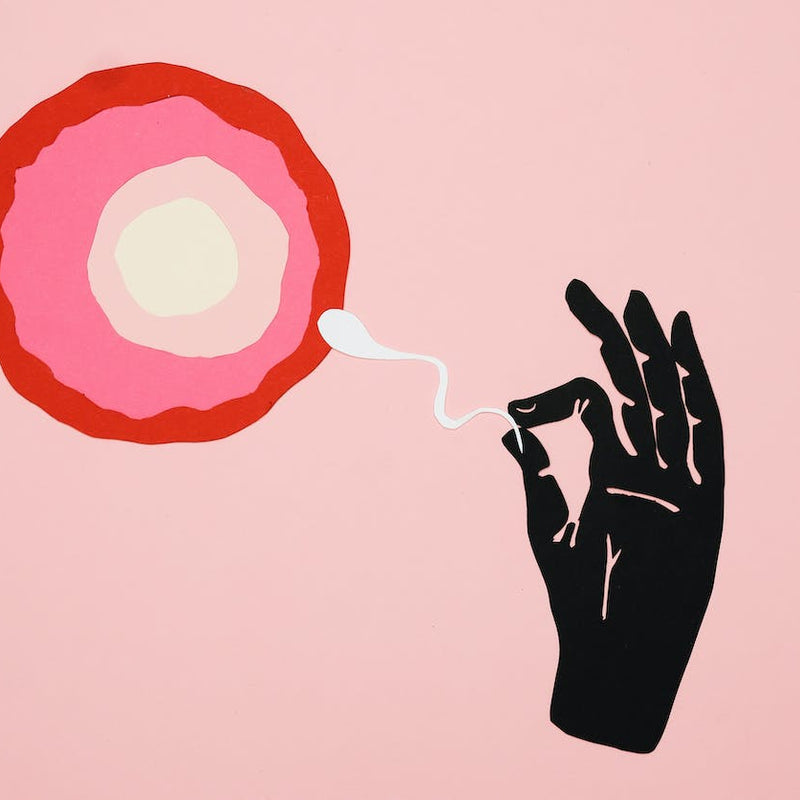How Do You Make Sex Exciting When It’s Scheduled Around Ovulation?

Thanks for sending in your questions! Licensed clinical psychologist Dr. Nazanin Moali answered all your questions about sex and intimacy when TTC.
How do I get my husband to get in the mood? He never wants to perform when I’m ovulating.
Focus on having the sex that you enjoy and avoid the need to achieve a certain number of intercourses during your ovulation window. Sometimes couples over-schedule themselves during this time, turning sex into another item on their ‘to do’ list. Remember, sperm may live up to five days inside the vagina, so over-scheduling is not only unnecessary, but in fact, may lead to loss of desire.
Instead, attempt to turn sex fun instead of a chore. Incorporating seductive activities that you enjoyed when you were dating will put both of you in the right mood. A few days before, heat up the anticipation by sending explicit photos, making suggestive moves, and exchanging hot texts (just double check the recipient name before hitting send!).
How do you make sex exciting when it’s scheduled around ovulation?
Don’t limit your sexual play to penile-vaginal penetration only. In order to make sex fun, explore your sexual fantasies, fetishes, kinks, and new positions. The more exciting your sexual experiences become, the more likely you are to desire in the future.
I’m finding that I don’t want to have sex if I’m not ovulating, how can I get in the mood and have sex just for fun?
Cultivating sexual desire is similar to learning any other skill. Furthermore, proper planning, patience, and practice play key roles as well. Our desire is like a garden. For this garden to bloom, we need to plant seeds. I recommend reading erotica, watching explicit content, or immersing yourself in your favorite fantasy as ways to “plant seeds” in your garden.
Rushing into intercourse is one of the main reasons why women lose their sexual interest during this time period. Instead, consider engaging in playful, extended touching. Focus on exploring different parts of each other’s bodies for at least 20-25 minutes. Experiment with various forms of touch and pressure and create a space for exploration and fun.
Rushing into intercourse is one of the main reasons why women lose their sexual interest during this time period.
How do you keep it exciting when there are times you can’t have sex during fertility treatments like IVF?
Keep in mind that sex does not mean intercourse! Although you might generally be more comfortable with having intercourse, this may be a good time to experiment with different forms of outercourse activities such as mutual masturbation, oral sex, and manual stimulation.
What to do about vaginal dryness?
First, I recommend dedicating at least 20-25 minutes to foreplay. For some women, lack of lubrication may indicate that they are not aroused enough. In addition, I suggest investing in a fertility-friendly lubricant. In a recent study by Indiana University, 97 percent of the participants reported that using lubricants made sex feel better.
Infertility has permanently ruined my sex life.
Women may experience tremendous stress as they cope with infertility. Aside from the stress related to failed treatments, they may be impacted by sadness and frustration of not being able to conceive. During these times, feelings of being overwhelmed and disappointed are normal. Many women reconnect with their sexuality within a few years of being diagnosed with infertility. If you are struggling with this issue long term, I recommend a consultation with a sex therapist.
Is there anything I can take that’s TTC /pregnancy safe to get into the mood? Like a female Viagra?
I am not able to give medical advice since it is outside my scope of expertise; however, understanding the framework of female sexuality can help you increase your desire, naturally. The sexual response in women is the product of the balance between the excitatory and inhibitory systems. In essence, individuals have their own unique ‘sexual accelerators.’ These may be sights, sounds, physical sensations, words, fantasies, and ideas that create sexual excitement within them. The opposite of ‘sexual accelerators’ are ‘sexual brakes,’ which they may find as UN-erotic.
If you want to increase your libido, you not only want to be familiar with your own personal accelerators and increase those, but you should also understand your personal brakes and decrease them. Our accelerators or brakes are shaped by the combination of our culture, previous experiences, and individual bodies. They occur on a subconscious level, and while most often stable, they can change over time and throughout your life. In my professional experience, for many women, the secret to increasing their sexual desire resides in understanding their brakes and addressing them.
If you want to increase your libido, you not only want to be familiar with your own personal accelerators and increase those, but you should also understand your personal brakes and decrease them.
How do I talk to my husband about ED and performance anxiety while TTC?
First, it is normal for men of all ages to experience struggles with erectile functioning. If this is a recurrent issue, I recommend initiating the conversation by setting a brief, timed session (e.g. 15 min) to talk to them about it. Ask him in advance when would be a good time to talk about a topic that is important to you. Start the conversation by mentioning something that you like about your sexual interaction. Give him a compliment about what he does well, and afterwards, talk about what you have observed in a neutral way. Ask him open-ended questions about how you can support him in problem solving this challenge. Honor the time limit you have assigned to prevent unnecessary discomfort or possible emotional shut down.
My partner feels pressure during my fertile window which kills his drive. What suggestions?
One of the best ways to help with managing the pressure is to practice 10-15 minutes of mindful breathing exercises each week. You can also combine the breathing exercises with sensual massage exercises with your partner.
Tips on how stay calm and relax during this time?
It is important to reduce your psychological vulnerability for optimal mental wellness during this time. Focus on getting a proper amount of sleep, eating balanced meals, and incorporating regular movement in your days.
Intimacy advice for LGBTQ+ couples going through fertility treatments?
Although there are many similarities in the struggles of both heterosexual and LGBTQ+ couples as they go through fertility treatments, LGBTQ+ couples may experience unique challenges as a result of possible minority stress and discrimination. My advice is to surround yourself with community resources and friends who will support you throughout this process. Also, remember that sex could be a great stress relief!
Any advice for navigating the TTC conversation as an LGBTQ+ couple?
It is important to have clear expectations about each partner’s financial, legal, and biological responsibility prior to starting the process. I highly recommend meeting with a couple’s therapist who specializes in working with LGBTQ+ couples.
Is it safe to have pregnancy sex?
Unless your doctor advises otherwise, it is completely safe to have sex during pregnancy. Many women experience an increased sexual drive in the second trimester, which leads them to experience even more sexual pleasure. If you are experiencing a complicated pregnancy, however, consult with your physician first.
Many women experience an increased sexual drive in the second trimester, which leads them to experience even more sexual pleasure.
We’ve given up for the moment, but I’m still super depressed about TTC.
During this time, I suggest incorporating activities that give you pleasure. Scheduling regular pleasurable activity on your daily calendar can help you feel more energized. Also, it might be a good time to consider talking to a licensed mental health provider.
To get pregnant, does it matter how “deep” penetration is?
There is no scientific support for “deeper” penetration increasing your odds of getting pregnant. With hundreds of millions of sperms released during ejaculation, as long as they are deposited inside the vagina, you are set to go!
Dr. Nazanin Moali is a licensed clinical psychologist and an expert in everything related to psychology of food, sex, and drugs. She has extensive training in sex therapy and broad experience in the psychology of human sexuality. Dr. Moali is also the host of the Sexology podcast.
Shop Products From This Article
Backed by science, trusted by mothers
We’re glad you’re here—join thousands of happy customers on the journey to parenthood and beyond.
Shop Now























